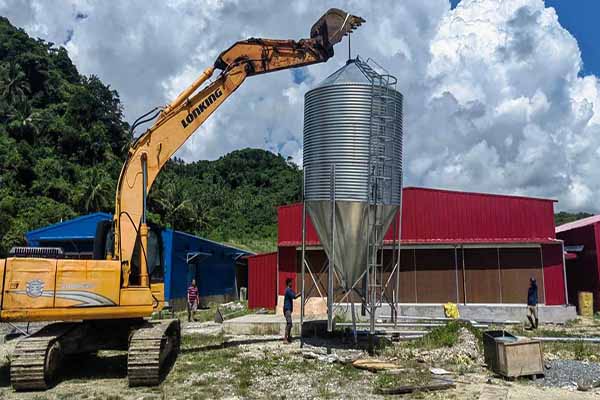Automated Solution for Manure Treatment in Tanzania Chicken Farms by Livi Mechanical Equipment
Time : 2025-07-24
In Tanzania, the poultry industry has seen remarkable growth over the years, and with it, the challenges of manure treatment have become increasingly pressing. At Livi Mechanical Equipment, a leading manufacturer of poultry equipment from China, we understand the critical role of automated manure treatment solutions in maintaining the sustainability and hygiene of chicken farms. This article explores how our automated solution can address these challenges and enhance the overall efficiency of poultry operations in Tanzania.
The Challenges of Manure Treatment in Chicken Farms
Manure, a byproduct of poultry farming, can be both a challenge and an opportunity. While it’s a valuable fertilizer when properly managed, it can also pose serious health and environmental risks if not treated appropriately. Here are some of the primary challenges:
1. Odor Control: Manure decomposition produces harmful gases like ammonia, methane, and hydrogen sulfide, which are not only offensive but can also cause respiratory issues for both farm workers and chickens.
2. Disease Control: Untreated manure can harbor pathogens and pests that can spread diseases among chickens and affect human health.
3. Resource Utilization: The potential for converting manure into organic fertilizers and bioenergy is enormous, but this process requires effective and efficient technology.
4. Environmental Impact: Improper manure management can lead to water and soil pollution, affecting the local ecosystem.
Our Automated Solution for Manure Treatment
At Livi Mechanical Equipment, we have developed an automated solution designed to tackle these challenges head-on. Our system is engineered to process chicken manure efficiently, turning it into valuable resources while minimizing environmental impact.
Key Features of Our Automated Manure Treatment Solution
1. Sewage Treatment Equipment: Our solution incorporates advanced sewage treatment technology that can effectively separate solid waste from liquid manure. This not only controls odor but also ensures the separation of harmful pathogens.
2. Solids Separation and Dewatering: Our system includes a solids separator that can effectively dewater manure solids, which are then further processed for use as organic fertilizers.
3. Odor Control Systems: Our technology incorporates odor control measures, such as biofilters, that capture harmful gases before they escape into the atmosphere.
4. Automated Control Panels: Our systems are equipped with automated control panels that allow for easy operation and monitoring, ensuring optimal performance at all times.
5. Energy Efficiency: Our designs are energy-efficient, reducing the overall operating costs and carbon footprint of poultry farms.
The Process: From Manure to Valuable Resources
1. Inflow: Raw manure is fed into the system through an inflow hopper.
2. Solids Separation: The solid particles are separated from the liquid, and the liquid passes through the next stage of treatment.
3. Solid Treatment: The separated solids are dried and composted to create organic fertilizer.
4. Liquid Treatment: The liquid manure undergoes anaerobic digestion, producing biogas, which can be used as a renewable energy source.
5. Odor Control: Harmful gases are captured and neutralized using our advanced biofilter technology.
The Benefits of Our Automated Solution
By adopting our automated manure treatment solution, Tanzania’s chicken farms can expect a range of benefits:
– Enhanced Farm Efficiency: Automation streamlines the manure treatment process, saving time and labor costs.
– Health and Safety: Reduced odor and the absence of harmful pathogens create a safer environment for farm workers and chickens.
– Sustainability: By converting manure into valuable resources, our solution supports sustainable agricultural practices.
– Environmental Protection: The system helps to prevent water and soil pollution, contributing to a healthier ecosystem.
– Economic Advantages: The sale of organic fertilizers and the use of biogas as a fuel source can increase farm revenue.
Case Studies: Successful Implementations in Tanzania
Our automated manure treatment solution has already been successfully implemented in several chicken farms across Tanzania. These case studies highlight the positive impact of our technology on poultry farming operations:
– Nyang’oma Chicken Farm: This farm experienced significant odor reduction and disease control after installing our system, leading to increased productivity and improved farm health.
– Tabora Poultry Farm: By converting manure into organic fertilizer, the farm saw a boost in its income from fertilizer sales.
– Arusha Chicken Farm: The installation of our solution not only reduced environmental pollution but also helped the farm secure funding for future expansion through improved sustainability practices.
Conclusion
As the poultry industry continues to grow in Tanzania, the need for effective and sustainable manure treatment solutions becomes more pressing. Livi Mechanical Equipment is committed to providing cutting-edge automated manure treatment technology that addresses these challenges head-on. Our solutions not only enhance farm efficiency and health but also contribute to the overall sustainability of Tanzania’s agricultural sector.












